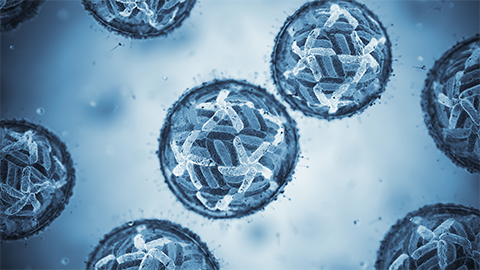Host fatty acids enhance dengue virus infectivity
Mosquito-borne flavivirus infections cause changes in host lipid metabolism. For example, scientists found that the dengue virus, which has no known antiviral treatments, recruits host fatty acid synthase to aid in viral replication. In a recent Journal of Biological Chemistry article, Julia Hehner at Philipps University Marburg and a team in Germany investigated the reliance of various flaviviruses on host fatty acid elongases and desaturases, key enzymes in the biosynthesis of monounsaturated and polyunsaturated fatty acids.

Working with a human hepatic cell line, the authors used RNA interference to individually knock down each fatty acid elongase and desaturase, enzymes that catalyze specific steps for producing fatty acids of different lengths. They exposed the cell lines to dengue, Zika, West Nile, yellow fever and tick-borne encephalitis viruses to measure viral replication. Only dengue virus showed sensitivity to the knockdowns, indicating that this virus relies on fatty acids of specific lengths, while the other viruses can compensate for the loss of one enzyme. Knocking down either the ultra-long-chain elongase ELOVL4 or desaturase FADS2 caused decreased dengue viral titers.
The researchers determined that ELOVL4 knockdown led to slightly lower viral protein levels in the infected cells, possibly signaling ELOVL4 involvement in delaying RNA replication. Surprisingly, the cells lacking FADS2 showed a slight increase in viral protein levels. The authors next measured plaque formation of dengue virus particles produced by the knockdown cell lines and found that cells lacking FADS2 produced viral particles with diminished infectivity. This indicates that FADS2 may promote lipid synthesis necessary for dengue virion assembly.
Future studies will help address the mechanisms behind the observed increase in viral protein levels upon FADS2 knockdown. Further experiments will also help researchers fill in the mechanistic details about how the ultra-long-chain fatty acids produced by ELOVL4 enhance dengue virus infectivity.
Enjoy reading ASBMB Today?
Become a member to receive the print edition four times a year and the digital edition monthly.
Learn moreGet the latest from ASBMB Today
Enter your email address, and we’ll send you a weekly email with recent articles, interviews and more.
Latest in Science
Science highlights or most popular articles

Building a career in nutrition across continents
Driven by past women in science, Kazi Sarjana Safain left Bangladesh and pursued a scientific career in the U.S.

Avoiding common figure errors in manuscript submissions
The three figure issues most often flagged during JBC’s data integrity review are background signal errors, image reuse and undeclared splicing errors. Learn how to avoid these and prevent mistakes that could impede publication.

Ragweed compound thwarts aggressive bladder and breast cancers
Scientists from the University of Michigan reveal the mechanism of action of ambrosin, a compound from ragweed, selectively attacks advanced bladder and breast cancer cells in cell-based models, highlighting its potential to treat advanced tumors.

Lipid-lowering therapies could help treat IBD
Genetic evidence shows that drugs that reduce cholesterol or triglyceride levels can either raise or lower inflammatory bowel disease risk by altering gut microbes and immune signaling.

Key regulator of cholesterol protects against Alzheimer’s disease
A new study identifies oxysterol-binding protein-related protein 6 as a central controller of brain cholesterol balance, with protective effects against Alzheimer’s-related neurodegeneration.

From humble beginnings to unlocking lysosomal secrets
Monther Abu–Remaileh will receive the ASBMB’s 2026 Walter A. Shaw Young Investigator Award in Lipid Research at the ASBMB Annual Meeting, March 7-10 in Washington, D.C.

